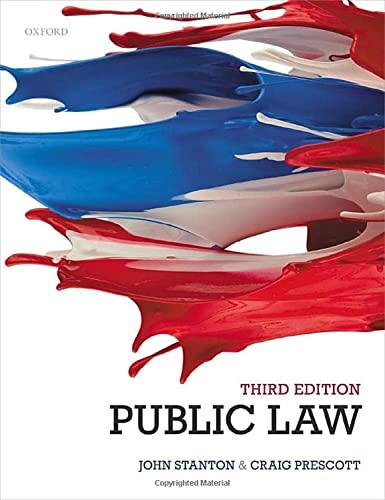Question
1. The starving crewmen In 1884 four English sailors were stranded at sea, over a thousand miles away from land. The four crewmen were Dudley
1. The starving crewmen In 1884 four English sailors were stranded at sea, over a thousand miles away from land. The four crewmen were Dudley (captain), Stephens (first mate), Brookes (sailor) and Parker (cabin boy). They had very few provisions, eating cans and a turtle. On the 18th day, Parker, the cabin boy who had drunk seawater, was lying on the floor of the boat sick. On the 19th day, Dudley suggested drawing lots to determine who would die, so the others would live. The next day, Dudley decided that the boy had to die. He told Parker his time had come, said a payer and then stabbed and killed Parker. Four the next four days, the three remaining crewmen sustained themselves by eating Parker. On the 24th day, the men were rescued. Dudley and Stephens admitted what they had done, but they argued it was out of necessity. Sacrificing one life, to save three others.
2. The Overcrowded Lifeboat In 1842, a ship struck an iceberg and more than 30 survivors were crowded into a lifeboat intended to hold 7. As a storm threatened, it became obvious that the lifeboat would have to be lightened if anyone were to survive. The captain reasoned that the right thing to do in this situation was to force some individuals to go over the side and drown. Such an action, he reasoned, was not unjust to those thrown overboard, for they would have drowned anyway. If he did nothing, however, he would be responsible for the deaths of those whom he could have saved. Some people opposed the captain's decision. They claimed that if nothing were done and everyone died as a result, no one would be responsible for these deaths. On the other hand, if the captain attempted to save some, he could do so only by killing others and their deaths would be his responsibility; this would be worse than doing nothing and letting all die. The captain rejected this reasoning. Since the only possibility for rescue required great efforts of rowing, the captain decided that the weakest would have to be sacrificed. In this situation it would be absurd, he thought, to decide by drawing lots who should be thrown overboard. As it turned out, after days of hard rowing, the survivors were rescued and the captain was tried for his action. If you had been on the jury, how would you have decided?
3. A Father's Agonizing Choice You are an inmate in a concentration camp. A sadistic guard is about to hang your son who tried to escape and wants you to pull the chair from underneath him. He says that if you don't he will not only kill your son but some other innocent inmate as well. You don't have any doubt that he means what he says. What should you do?
4. Sophie's Choice In the novel Sophie's Choice, by William Styron (Vintage Books, 1976 the 1982 movie starred Meryl Streep & Kevin Kline), a Polish woman, Sophie Zawistowska, is arrested by the Nazis and sent to the Auschwitz death camp. On arrival, she is "honored" for not being a Jew by being allowed a choice: One of her children will be spared the gas chamber if she chooses which one. In an agony of indecision, as both children are being taken away, she suddenly does choose. They can take her daughter, who is younger and smaller. Sophie hopes that her older and stronger son will be better able to survive, but she loses track of him and never does learn of his fate. Did she do the right thing? Years later, haunted by the guilt of having chosen between her children, Sophie commits suicide. Should she have felt guilty?
1. What were the moral dilemmas present in each case?
2. Why did the judges decide the way that they did? What were their justifications?
3. Do you agree or disagree with the decision in each case? Why?
4. How do you think you would have decided in a similar situation and why?
5. Is the law and morality always at odds?
Step by Step Solution
There are 3 Steps involved in it
Step: 1

Get Instant Access to Expert-Tailored Solutions
See step-by-step solutions with expert insights and AI powered tools for academic success
Step: 2

Step: 3

Ace Your Homework with AI
Get the answers you need in no time with our AI-driven, step-by-step assistance
Get Started


